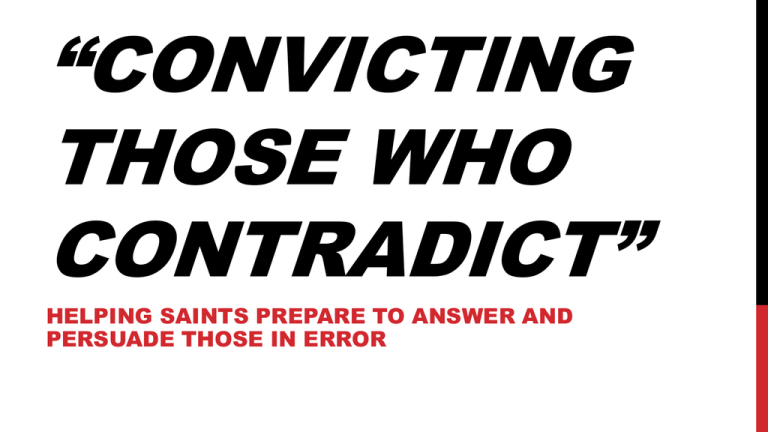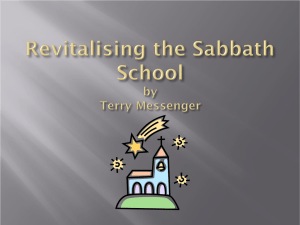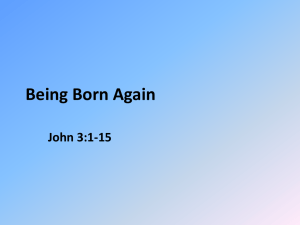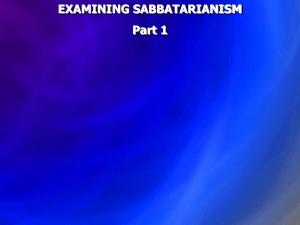
“CONVICTING
THOSE WHO
CONTRADICT”
HELPING SAINTS PREPARE TO ANSWER AND
PERSUADE THOSE IN ERROR
SEVENTH DAY CHURCHES
•
•
•
•
Seventh Day Adventists
Seventh Day Baptists
Church Of God, 7th Day
Worldwide Church Of God
(Herbert W. Armstrong)
• Et al.
2
The Law of Moses—
with the 10 Commandments—
was nailed to the
cross of Christ
SEVENTH DAY SABBATH KEEPERS
3
SUPREMACY OF
CHRIST OVER
MOSES
A soft answer turns away wrath,
But a harsh word stirs up anger.
—Proverbs 15:1 NKJV
4
Walk in wisdom toward those who are outside,
redeeming the time. Let your speech always be
with grace, seasoned with salt, that you may
know how you ought to answer each one.
—Colossians 4:5, 6 NKJV
BARRIER #1 – PERCEIVED MOTIVE
• Concerned about moral decay
• Emphasize obedience to God’s Law
• Connect love and obedience (John 14:15)
• No Ten Commandments =>
• No law? Loose living?
• Undermining God’s authority?
5
• Make your intentions clear
BARRIER #2 – NOMENCLATURE
• Ten Commandments
• Venerated, elevated
• Moral law, universal
• Law of Moses
• Relegated, diminished
• Ceremonial law, temporary, shadow
6
• Let Scripture define the terms
1. “How can you say that we should not keep the
Sabbath? It’s one of the Ten Commandments! John
14:15 says, ‘If you love me, keep My commandments.’
Just what commandments do you think he’s talking
about?”
7
Now by this we know that we know Him, if we keep His
commandments. He who says, “I know Him,” and does
not keep His commandments, is a liar, and the truth is not
in him.
—1st John 2:3, 4 NKJV
WHICH COMMANDMENTS?
In the Sabbatarian mind …
• Commandment(s) almost a technical term
• Commandments = Ten Commandments
• Law of God
• Universal, eternal Moral Law
• Everything else: Ceremonial Law
8
• Law of Moses
• Statutes, judgments, ordinances
WHICH COMMANDMENTS?
Does commandment(s) always equal the
Ten Commandments?
• Great commandment in the law? (Matthew 22:36)
• “Love the LORD …” (Deuteronomy 6:5)
• “Love your neighbor …” (Leviticus 19:18)
• Not one of the Ten
• Leviticus & Numbers = Commandments
9
• Leviticus 27:34 (final verse)
• Numbers 36:13 (final verse)
• Ten Commandments nowhere in Leviticus/Numbers
WHICH COMMANDMENTS?
Do statutes, judgments, etc., never refer to the
Ten Commandments?
• Ezekiel 20:15, 16, 21
• “Statutes” and “judgments” include the Sabbath
• “Statutes”, “judgments”, “commandments”, and
“covenant”
• Synonyms
• All one law
10
• Leviticus 26:15
WHICH COMMANDMENTS?
Covenant: Another synonym
• “Tablets of the Covenant”
• Exodus 34:1, 4, 28 – “… words of the covenant”
• Specifically the Ten Commandments
• Deuteronomy 9:9, 11, 15
• Hebrews 9:1–4
• Jeremiah 31:31–34
• New covenant
11
• What would God make with Israel & Judah?
WHICH COMMANDMENTS?
Law of the LORD vs. Law of Moses
• Technical terms or keywords
• “Law of God” = moral law (the Ten)
• “Law of Moses” = ceremonial law
• Law of God attributed to Moses
• Mark 7:9, 10 – “Moses said …”
• 2nd Chr. 34:14; Neh. 10:29 – “Given by Moses”
12
• Sabbath: Nations/Gentiles never rebuked
WHICH COMMANDMENTS?
Law of the LORD vs. Law of Moses
• “Ceremonial” laws called “Law of the LORD”
• Luke 2:23 – cf. Exodus 13:2, 12, 15
• 2nd Chronicles 31:3 – burnt offerings
• Ezra 7:6 – “the LORD God … had given”
• Moral laws in “ceremonial” sections
13
• Leviticus 18 – Sex
• Exodus 21–23 – Various moral laws
WHICH COMMANDMENTS?
Law of the LORD vs. Law of Moses
• Nehemiah 8 – The definitive word
•
•
•
•
•
“Book of the Law of Moses”
“The Law”
“Book of the Law”
“Law of God”
“Book of the Law of God”
14
• All one Law
REVIEW
Barriers
1. Perceived motive
• Arguing against any law in favor of cheap grace
• Undermining God’s authority: Changing things God has not
• Dispel these notions: Make your intentions clear
2. Nomenclature
15
• Moral Law: Law of the LORD/God, commandments (the Ten)
vs.
• Ceremonial Law: Law of Moses, statutes, judgments, etc.
• Go to the Bible: Let Scripture define the terms
REVIEW
1. “How can you say that we should not keep the
Sabbath? It’s one of the Ten Commandments! John
14:15 says, ‘If you love me, keep My commandments.’
Just what commandments do you think he’s talking
about?”
16
Now by this we know that we know Him, if we keep His
commandments. He who says, “I know Him,” and does
not keep His commandments, is a liar, and the truth is not
in him.
—1st John 2:3, 4 NKJV
Idea
Passage(s)
“Commandments” not just the Ten
Commandments
Leviticus 19:18; 27:34
Numbers 36:13
Deuteronomy 6:5
“Statutes”, “judgments” include the Sabbath
Ezekiel 20:15, 16, 21
Synonyms: “statutes”, “judgments”,
“commandments”, “covenant”
Leviticus 26:15
“Tablets of the covenant”, i.e., the Ten
Commandents
Exodus 34:1, 4, 28
Deuteronomy 9:9, 11, 15
Hebrews 9:1–4
The new covenant
Jeremiah 31:31–34
17
REVIEW
Idea
Passage(s)
“Law of God” attributed to Moses
Mark 7:9, 10
2nd Chronicles 34:14
Nehemiah 10:29
“Law of the LORD” includes “ceremonial” laws
Luke 2:23
(cf. Exodus 13:2, 12, 15)
2nd Chronicles 31:3
Ezra 7:6
“Moral laws” outside the Ten Commandments
Leviticus 18
Exodus 21–23
All one law: “Book of the Law of Moses”, “the Law”,
“Book of the Law”, “Law of God”, “Book of the Law
of God”
Nehemiah 8
18
REVIEW
WHICH COMMANDMENTS?
“The Law”
Refers to
Galatians 4:21ff
Genesis 21
Romans 7:7
Exodus 20 (Ten Commandments)
Matthew 22:35–39
Deuteronomy 6; Leviticus 19
Matthew 12:5
Num. 28:9, 10 (Sabbath offerings)
Romans 3:10–12
Psalms 53:1–3
Romans 3:15, 16
Proverbs 1:16
1st Corinthians 14:21
Isaiah 28:11, 12
19
The Law = the Old Testament
WHICH COMMANDMENTS?
The Old Law is No More
• We are dead to the Law
• Romans 7:1–7
• “You shall not covet.” (one of the Ten)
• No middle wall of separation
20
• Ephesians 2:11–16
• The Law = Enmity
• “abolished … the law of commandments”
WHICH COMMANDMENTS?
The Old Law is No More
• No more handwriting of requirements
• Colossians 2:13–17
• “let no one judge you in … sabbaths”
• We are under the New Covenant
• New Covenant more glorious than Old
• Old Covenant written on stones
21
• Hebrews 8:7–13 – Old Covenant obsolete
• 2nd Corinthians 3:7–11 – “ministry of death”
WHICH COMMANDMENTS?
• John 14:15 – “Keep my commandments”
• Luke 6:46 – “… the things which I say?”
• 2nd John 9 – “Doctrine of Christ”
• Matthew 5 & 19 – “But I say to you …”
• Matthew 28:18 – “All authority … given to Me”
• John 16:13 – “Spirit … guide you into all truth”
• 1st Corinthians 14:37 – Paul wrote the
“commandments of the Lord”
22
Words of Jesus, the Holy Spirit, the Apostles
2. “But God wrote the Ten Commandments in stone with
His own finger (Exodus 31:18)! Why would God
change the Sabbath, which He clearly intended to be
permanent?”
23
And when He had made an end of speaking with him on
Mount Sinai, He gave Moses two tablets of the
Testimony, tablets of stone, written with the finger of
God.
—Exodus 31:18 NKJV
THE FINGER OF GOD
God can repeal His own writing
• Fallacies: Appeal to authority; non sequitur
• Jeremiah 31:31–34
• Who is making the new covenant? God!
• Hebrews 8:7–13 – “obsolete”, “vanishing”
• 2nd Corinthians 3:7–11
24
• “Ministry of death”
• Written on stones
3. “Genesis makes it very clear that God established the
Sabbath at creation: He blessed and sanctified it
(Genesis 2:3). The Sabbath is for all time!”
25
Then God blessed the seventh day and sanctified it,
because in it He rested from all His work which God had
created and made.
—Genesis 2:3 NKJV
WHEN WAS THE SABBATH REVEALED?
God revealed/commanded the Sabbath at Sinai
• Fallacy: Equivocation; red herring
• Revealed at Sinai – Nehemiah 9:13, 14
Exodus 16:23 – First appearance of “Sabbath”
Exodus 16:1 – Month 2, day 15 out of Egypt
Exodus 19:1 – Arrived at Sinai in 3rd month
Exodus 20:8 – Formally codified
26
•
•
•
•
WHEN WAS THE SABBATH REVEALED?
God revealed/commanded the Sabbath at Sinai
• Anything else ordained long beforehand, but not
revealed until much later?
27
• Salvation in Jesus
• 1st Peter 1:18–20
• Ephesians 1:4–10
WHEN WAS THE SABBATH REVEALED?
God revealed/commanded the Sabbath at Sinai
• “Abraham … kept … My commandments” –
Genesis 26:5
• Point to be proven assumed (gratuitous assertion)
• Previous bullets prove otherwise
• No recorded commandments?
• Genesis 12:1 – Leave Ur
• Genesis 17:9ff – Circumcision
• Genesis 22:2 – Sacrifice Isaac
28
• “But Adam/Abraham kept the Sabbath”
WHEN WAS THE SABBATH REVEALED?
God revealed/commanded the Sabbath at Sinai
• Prolepsis (possibly?)
Genesis 23:2 – Kirjath Arba (Hebron)
Joshua 18:28 – Jebus (Jerusalem)
Genesis 7:2? – Clean/unclean animals
Not likely: Genesis 2:3 – “Then …”
29
•
•
•
•
4. “God does not change (Hebrews 13:8); therefore His
law does not change!”
30
Jesus Christ is the same yesterday, today, and forever.
—Hebrews 13:8 NKJV
HAS GOD’S LAW NEVER CHANGED?
A necessary change in the Law
31
• Fallacy: Non sequitur
• Jeremiah 31:31–34 – New Covenant
• Hebrews 7:12 – New priesthood New Law
5. “God Himself said that the Sabbath was ‘perpetual’ and
‘forever’ for all generations (Exodus 31:16, 17). Last
time I checked, ‘forever’ means ‘until the end of time’!”
32
“Therefore the children of Israel shall keep the Sabbath, to
observe the Sabbath throughout their generations as a
perpetual covenant. It is a sign between Me and the
children of Israel forever; for in six days the LORD made
the heavens and the earth, and on the seventh day He
rested and was refreshed.”
—Exodus 31:16, 17 NKJV
IS “PERPETUAL” “WITHOUT END”?
“Perpetual”, “everlasting”, “forever” not ad infinitum
Passage
Feast of Unleavened Exodus 12:17
Bread
Grain offering
Leviticus 6:15–18;
23:13–14
Burnt offering
Exodus 29:39–42
Burn incense
Exodus 30:8
Sin offering
Exodus 30:10
Anointing oil
Exodus 30:31
Atonement yearly
Exodus 30:10
Ordinance
Passage
Day of Atonement
Leviticus 23:28–31
Heave offering
Numbers 15:21
Tabernacle work
Numbers 18:22, 23
Priestly washing
Exodus 30:21
Feast of
Tabernacles
Passover
Leviticus 23:34–43
Carry breast piece
Exodus 28:29
Exodus 12:14
33
Ordinance
IS “PERPETUAL” “WITHOUT END”?
“Perpetual”, “everlasting”, “forever” not ad infinitum
• The explanation is in the passage (Exodus 31:16, 17)
“the children of Israel shall keep the Sabbath”
“sign between Me and the children of Israel”
“throughout their generations as a perpetual covenant”
In effect …
• For Israel (not all nations)
• For the duration of the covenant
34
•
•
•
•
6. “Jesus didn’t destroy the Law; He fulfilled it. He even
said that the Law would last ‘till heaven and earth
pass away’ (Matthew 5:17, 18). It’s ridiculous to
suggest that we are not obligated to rest on the
Sabbath!”
35
“Do not think that I came to destroy the Law or the
Prophets. I did not come to destroy but to fulfill. For
assuredly, I say to you, till heaven and earth pass away,
one jot or one tittle will by no means pass from the law
till all is fulfilled.”
—Matthew 5:17, 18 NKJV
TILL HEAVEN AND EARTH PASS AWAY?
“Heaven”, “earth” not sole termination clause
• “Till all is fulfilled”
36
• Jesus fulfilled the Law – Luke 24:44–48
• Christ: the end/goal of the Law
• Romans 10:4
• Galatians 3:24
TILL HEAVEN AND EARTH PASS AWAY?
“Heaven”, “earth” not sole termination clause
• Not destroyed, but fulfilled
37
• Contracts/covenants can end by …
• Being broken
• Being fulfilled/completed
• Jesus fulfilled
• Deuteronomy 18:15, 18,19
• Cf. Acts 3:22–26
TILL HEAVEN AND EARTH PASS AWAY?
“Heaven”, “earth” not sole termination clause
• Only “heaven”, “earth” – Luke 16:17
“Fail” not “pass away”
Jesus fulfilled
The Law did not fail
See also v. 16
38
•
•
•
•
7. “Not only are we to keep the Sabbath until the end of time,
but Isaiah says we’ll be keeping it in heaven (Isaiah 66:22,
23)! If we’re to keep the Sabbath throughout eternity, you
can’t possibly think it’s right for us to just ignore it now!”
39
“For as the new heavens and the new earth
Which I will make shall remain before Me,” says the LORD,
“So shall your descendants and your name remain.
And it shall come to pass
That from one New Moon to another,
And from one Sabbath to another,
All flesh shall come to worship before Me,” says the LORD.
—Isaiah 66:22, 23 NKJV
SABBATH KEEPING IN HEAVEN?
New heavens, new earth are New Covenant
• “I will gather all nations and tongues” – v. 18
(Cf. Isaiah 2:2–4)
• “your brethren for an offering” – v. 20
(Cf. Rom 12:1, 2)
• “take some … for priests and Levites” – v. 21
• No moon in heaven – Revelation 21:23
40
• Consistency: Observe New Moon, too? v. 23
• New Covenant; figurative language
8. “What about Matthew 24? (See v. 20) Christians will be
keeping the Sabbath to the very end!”
41
“And pray that your flight may not be in winter or on the
Sabbath.”
—Matthew 24:20 NKJV
END TIME SABBATH KEEPING?
AD 70, not the end of time
• Took place during Jesus’s generation – v. 34
• Hindrances to flight – vv. 15–20
42
• Pregnant & nursing – v. 19
• Why would Sabbath hinder flight?
• Cities of Israel observing Sabbath in AD 70
• City gates closed – Nehemiah 13:19
9. “Even Paul rested on the Sabbath during his
preaching journeys (Acts 17:2). How can you think we
should not do the same thing today?”
43
Then Paul, as his custom was, went in to them, and for
three Sabbaths reasoned with them from the Scriptures
—Acts 17:2 NKJV
PAUL OBSERVED THE SABBATH?
Not Sabbath rest; low hanging fruit
• What was Paul’s Sabbath custom?
Preaching to those present – Acts 13:14ff
“spoke to the women who met there” – Acts 16:13
“reasoned … from the Scriptures” – Acts 17:2
No mention of rest or worship
44
•
•
•
•
PAUL OBSERVED THE SABBATH?
Not Sabbath rest; low hanging fruit
• What was Paul’s Sabbath custom?
Preaching to those present – Acts 13:14ff
“spoke to the women who met there” – Acts 16:13
“reasoned … from the Scriptures” – Acts 17:2
No mention of rest or worship
45
•
•
•
•
10. “The Greek word in Colossians 2:16 is sabbaton
(σαββάτων). That means “Sabbaths” (plural), not
“Sabbath” (singular). Read Leviticus 23:23–38; God
calls the yearly feast days “Sabbath days”. Paul is
making no reference whatsoever to the weekly
Sabbath!”
46
So let no one judge you in food or in drink, or regarding a
festival or a new moon or sabbaths (σαββάτων),
—Colossians 2:16 NKJV
YEARLY SABBATH, NOT WEEKLY?
Yearly, monthly, weekly special days
• “Sabbath” singularity/plurality irrelevant
• “Festival” is yearly, not “Sabbaths”
• Paul employed OT idiom
Yearly
Monthly
Weekly
Daily
47
•
•
•
•
YEARLY SABBATH, NOT WEEKLY?
48
Yearly, monthly, weekly special days
49
11. “Nothing in Paul’s writings or anything in the New
Testament can erase the Old Testament. That would
make God a liar!”
IS GOD A LIAR?
Not an argument, but desperation
• Emotional appeal; addresses no argument
• Fallacy: Straw man
• We do not argue that the OT is erased
• “written for our learning” – Romans 15:4
• Reflects attitude toward apostles’ authority
50
• Matt 18:18 – bind/loose on earth also in heaven
• 1st Cor 14:37 – Paul wrote Lord’s commandments
51
ATTACKING
SUNDAY
WORSHIP
1. “The so-called ‘Christian Sabbath’ is not Sunday! The
only Sabbath is God’s Sabbath: the seventh day
Sabbath. The only reason anyone worships on Sunday
is because the Pope, in his arrogance, changed it
centuries ago to cater to pagans!”
• Other arguments
52
• Christians in Hadrian’s day
• Constantine
DID THE SABBATH DAY CHANGE?
Weekly day of worship, not a day of rest
• Fallacy: Straw man
• Denominations: Sunday = “Christian Sabbath”
• Wrong! 7th day Sabbath abolished, not changed
• Sunday not a day of rest
• Acts 20:7 – “came together to break bread”
• 1st Corinthians 16:1, 2 – “lay something aside”
• Christ rose on the first day (1st Corinthians 15)
53
• Christians worshipped together on Sundays
DID THE SABBATH DAY CHANGE?
Weekly day of worship, not a day of rest
• We keep the eighth day [Sunday] with joyfulness, the
day also on which Jesus rose again from the dead.
—100 AD, The Epistle of Barnabas 15:6–8
• But Sunday is the day on which we all hold our
common assembly, because … Jesus Christ our
Saviour on the same day rose from the dead.
—150 AD, (1st Apology of Justin, Weekly Worship of the
Christians, Ch. 68)
• Others: http://www.bible.ca/H-sunday.htm
54
• Historical record (secondary evidence)
So continuing daily with one accord in the temple, and
breaking bread from house to house, they ate their food
with gladness and simplicity of heart,
—Acts 2:46 NKJV
55
2. “Just because Acts 20:7 talks about ‘breaking bread’, it
does not prove that God changed the Sabbath. Acts
2:46 says that they broke bread daily from house to
house. Besides, if you keep reading in Acts 20, the
meeting took place at night, and Paul preached till
daybreak. If you’re going to be consistent, you have to
meet at night, all night, every night!”
ARE WE BEING INCONSISTENT?
“First day” is the significant detail
• Why meet at night?
• First day was a working day
• Only time to meet: pre-dawn / post-dusk
• Many Christians were slaves
• “… continued his message until midnight.” – v. 7
• “… even till daybreak …” – v. 11
• “Paul, ready to depart the next day, …” – v. 7
56
• Why preach till daybreak?
ARE WE BEING INCONSISTENT?
“First day” is the significant detail
• Lord’s supper – “bread … we break” (1 Cor 10:16)
• 1st Corinthians 11:17ff – “come together”
• Acts 20:7 – “came together to break bread”
• Common meal
• 1st Corinthians 11:34 – “let him eat at home”
• Acts 2:46 – “breaking bread from house to
house”
57
• Lord’s supper vs. common meal
ARE WE BEING INCONSISTENT?
“First day” is the significant detail
• Specific days of week not usually mentioned
58
• Sabbath
• Jesus performs healing miracle – John 9:14
• Paul preaching in synagogues – Acts 13:14
• No mention of church breaking bread
• Preparation day (day before Sabbath)
• Jesus’s crucifixion – Mark 15:42
ARE WE BEING INCONSISTENT?
“First day” is the significant detail
• Specific days of week not usually mentioned
59
• First day
• Resurrection – Matthew 28:1
• Church breaking bread – Acts 20:7
• Collection for saints – 1st Corinthians 16:1, 2
• No other mentions after resurrection
ARE WE BEING INCONSISTENT?
“First day” is the significant detail
• Conclusion
“At night” – circumstantial
“All night” – circumstantial
“Every night (day)” – misinterpretation
First day - significant
60
•
•
•
•
61
3. “1st Corinthians 16:2 makes absolutely no reference
whatsoever to a public meeting or church service for
when Paul arrives. Furthermore, the text reads, ‘lay
something aside’. That’s talking about setting
something aside at home, not in some fictitious
Sunday worship assembly!”
LAY SOMETHING ASIDE AT HOME?
No collections when Paul came
• Why did Paul want them to save regularly?
62
• “that there be no collections when I come.” – v. 1
• Saving at home requires another collection









